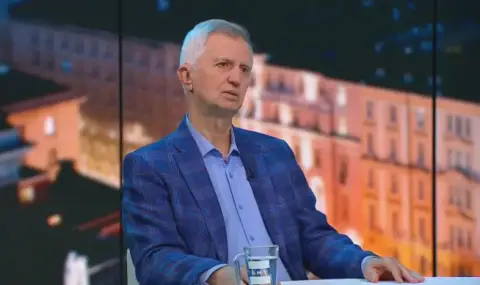The assembly's decision on constitutional changes is fruitless and it didn't lead to anything good. This is what he commented in the show "Speak Now" according to BNT, the former deputy prime minister and professor of criminal law at Sofia University - prof. Plamen Panayotov.
Asked if the decision of the so-called "assembly" to start with the changes in the Constitution, instead of solving the most pressing problems, prof. Panayotov replied:
"What not only I, but also other colleagues of mine said in advance, that what is being prepared is ultimately unconstitutional, turned out to be a fact after the decision of the Constitutional Court. In other words, what they united around turned out to be a futile decision, not leading to anything good, neither the judiciary nor the state. It resulted in even greater chaos and now we are waiting to see how far it will go, in the end the question again put before the Constitutional Court and for the other part of the changes, for which the necessary majority was gathered then."
According to the criminal law professor, we need to take stock of what has been happening in the last 3 years.
"In my opinion, frankly speaking, parties do not behave like parties. The main purpose of any party, even more so when it is represented in parliament, has to do with the question of power. And depending on the vote of the voters, either independently or together with other political entities, to exercise power. Society expects them to know if they want to and be able to form the necessary coalition, because it is obvious to all of us that no party gets an independent opportunity to exercise power. Therefore, they are forced to find common points of contact, on the basis of which they can form a government and give orientations to the Bulgarian society and the Bulgarian state as to where we are going."
When asked why the judicial system is always used as the dividing line between the parties, the professor replied:
"For the simple reason that all that is presented to us is one big demagoguery. Because a person, if he thinks about it, will understand that the first institution in the country, because it is in complete chaos, in disarray, cannot issue a regular cabinet after 7 consecutive parliamentary elections, which has a sufficient horizon of 4 years, and now we are preparing for the eighth consecutive extraordinary parliamentary elections, and we will realize, if we judge objectively what is presented to us, that these people are to the greatest extent to blame for the fact that the Supreme the judicial council has a long-expired mandate, that the inspectorate of the Supreme Judicial Council has a long-expired mandate, that more than 20 regulatory bodies in which the Bulgarian parliament has a quota also stand with expired mandates and with the impossibility of functioning themselves in the relevant horizon. To put it more generally, as soon as the first institution under the Constitution in the country does not function normally, it also affects all other institutions in the country."
Regarding the election of the chief prosecutor prof. Panayotov commented:
"I will recall the following that the current Supreme Judicial Council not only elected, but subsequently released the former chief prosecutor. Let's imagine the following, even the question is, in my opinion, rhetorical. That after all, in this parliament or in the next one, after the eighth extraordinary parliamentary elections in a row, or in the one after that, a ruling majority is still formed, and it cast its quota in a new Supreme Judicial Council. What can we think about this newly elected Supreme Judicial Council, since through it the goal, which is officially declared by most leaders of political subjects to date, is to control the bodies of the judiciary.
Obviously, even so, the newly elected SJC will find a way through parliament with relevant amendments to the Judiciary Act to raise the question again, even if the only candidate for chief prosecutor is currently elected, whether there are grounds for his release. In other words, the struggle for power without taking responsibility for it continues, claiming that one or the other body is illegitimate. And to whom is this illegitimacy due? Let's ask rhetorically again."
